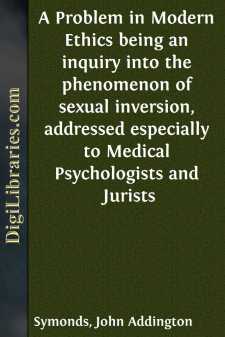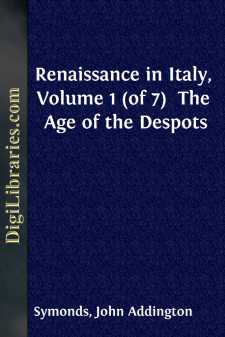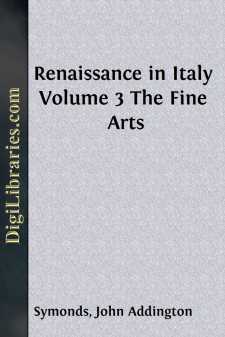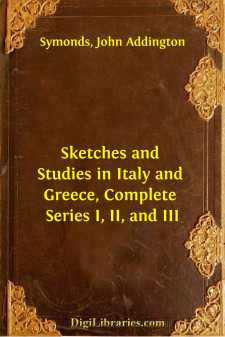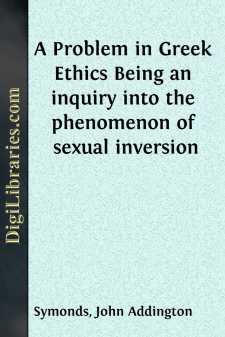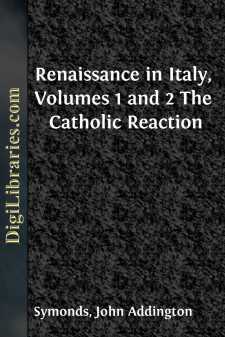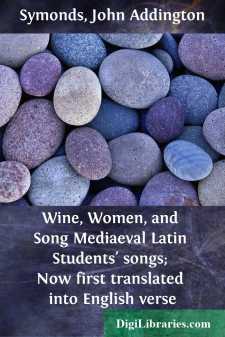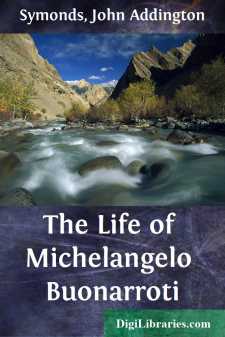Categories
- Antiques & Collectibles 13
- Architecture 36
- Art 48
- Bibles 22
- Biography & Autobiography 813
- Body, Mind & Spirit 142
- Business & Economics 28
- Children's Books 17
- Children's Fiction 14
- Computers 4
- Cooking 94
- Crafts & Hobbies 4
- Drama 346
- Education 46
- Family & Relationships 57
- Fiction 11829
- Games 19
- Gardening 17
- Health & Fitness 34
- History 1377
- House & Home 1
- Humor 147
- Juvenile Fiction 1873
- Juvenile Nonfiction 202
- Language Arts & Disciplines 88
- Law 16
- Literary Collections 686
- Literary Criticism 179
- Mathematics 13
- Medical 41
- Music 40
- Nature 179
- Non-Classifiable 1768
- Performing Arts 7
- Periodicals 1453
- Philosophy 64
- Photography 2
- Poetry 896
- Political Science 203
- Psychology 42
- Reference 154
- Religion 513
- Science 126
- Self-Help 84
- Social Science 81
- Sports & Recreation 34
- Study Aids 3
- Technology & Engineering 59
- Transportation 23
- Travel 463
- True Crime 29
John Addington Symonds
John Addington Symonds (1840-1893) was an English poet, literary critic, and cultural historian known for his work on the Renaissance. He was a pioneer in the field of sexual studies, particularly noted for his writings on homosexuality, which were considered groundbreaking at the time. Symonds also made significant contributions to the study of classical antiquity and the history of art and literature, with notable works including "Renaissance in Italy" and his translation of Michelangelo's sonnets.
Author's Books:
Sort by:
INTRODUCTION. There is a passion, or a perversion of appetite, which, like all human passions, has played a considerable part in the world's history for good or evil; but which has hardly yet received the philosophical attention and the scientific investigation it deserves. The reason of this may be that in all Christian societies the passion under consideration has been condemned to pariahdom;...
more...
CHAPTER I. THE SPIRIT OF THE RENAISSANCE. Difficulty of fixing Date—Meaning of Word Renaissance—The Emancipation of the Reason—Relation of Feudalism to the Renaissance—Mediæval Warnings of the Renaissance—Abelard, Bacon, Joachim of Flora, the Provençals, the Heretics, Frederick II.—Dante, Petrarch, Boccaccio—Physical Energy of the Italians—The Revival of Learning—The Double...
more...
CHAPTER I--THE PROBLEM FOR THE FINE ARTS Art in Italy and Greece—The Leading Phase of Culture—Æsthetic Type of Literature—Painting the Supreme Italian Art—Its Task in the Renaissance—Christian and Classical Traditions—Sculpture for the Ancients—Painting for the Romance Nations—Mediæval Faith and Superstition—The Promise of Painting—How far can the Figurative Arts express Christian...
more...
Of all the joys in life, none is greater than the joy of arriving on the outskirts of Switzerland at the end of a long dusty day's journey from Paris. The true epicure in refined pleasures will never travel to Basle by night. He courts the heat of the sun and the monotony of French plains,—their sluggish streams and never-ending poplar trees—for the sake of the evening coolness and the gradual...
more...
I. For the student of sexual inversion, ancient Greece offers a wide field for observation and reflection. Its importance has hitherto been underrated by medical and legal writers on the subject, who do not seem to be aware that here alone in history have we the example of a great and highly-developed race not only tolerating homosexual passions, but deeming them of spiritual value, and attempting to...
more...
CHAPTER 1. It is worse than useless to deplore the irremediable; yet no man, probably, has failed to mourn the fate of mighty poets, whose dawning gave the promise of a glorious day, but who passed from earth while yet the light that shone in them was crescent. That the world should know Marlowe and Giorgione, Raphael and Mozart, only by the products of their early manhood, is indeed a cause for...
more...
I.—Italiam Petimus. Italiam petimus! We left our upland home before daybreak on a clear October morning. There had been a hard frost, spangling the meadows with rime-crystals, which twinkled where the sun's rays touched them. Men and women were mowing the frozen grass with thin short Alpine scythes; and as the swathes fell, they gave a crisp, an almost tinkling sound. Down into the gorge,...
more...
CHAPTER I THE SPANISH HEGEMONY Italy in the Renaissance—The Five Great Powers—The Kingdom of Naples—The Papacy—The Duchy of Milan—Venice—The Florentine Republic—Wars of Invasion closed by the Sack of Rome in 1527—Concordat between Clement VII. and Charles V.—Treaty of Barcelona and Paix des Dames—Charles lands at Genoa—His Journey to Bologna—Entrance into Bologna and Reception...
more...
I. When we try to picture to ourselves the intellectual and moral state of Europe in the Middle Ages, some fixed and almost stereotyped ideas immediately suggest themselves. We think of the nations immersed in a gross mental lethargy; passively witnessing the gradual extinction of arts and sciences which Greece and Rome had splendidly inaugurated; allowing libraries and monuments of antique...
more...
CHAPTER I I The Buonarroti Simoni, to whom Michelangelo belonged, were a Florentine family of ancient burgher nobility. Their arms appear to have been originally "azure two bends or." To this coat was added "a label of four points gules inclosing three fleur-de-lys or." That augmentation, adopted from the shield of Charles of Anjou, occurs upon the scutcheons of many Guelf houses and...
more...


